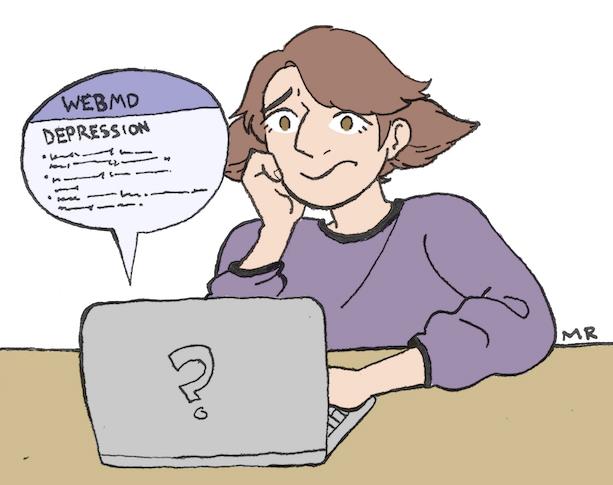Thanks to self-help books, and increasing open discussions revolving around mental health and personality disorders, many people fall into the trap of self-diagnosis. Although there is nothing wrong with being curious about self-exploration, and looking for answers online, it doesn’t make one an instant expert on personality disorders.
The human mind is a continuing subject of focus, intently studied by medical professionals and scientists. Despite the plethora of information online, there is still limited and ongoing studies about the causes and available treatments for various mental disorders.
One thing that makes self-diagnosing personality so dangerous is that people armed with little to no working knowledge of psychology and mental disorders, can and do quickly conclude the state of their mental health or others. Pointing out oneself or others as being OCD, bipolar, or manic without a certified diagnosis by a professional, can be very damaging.
At times, some people may feel that they do have a mental or physical illness which needs a professional diagnosis. If a person chooses to self-diagnose their believed condition, they might end up self-medicating, misdiagnosing themselves, or go untreated for whatever illness they may have.
Although there is helpful information online to guide seekers in the right direction, a self-diagnosing personality left unchecked can be a source of problems.
Some common symptoms that may be a sign of a mental or physical illness, which can lead to a misdiagnosis without professional assessment include:
- Feeling fatigued most of the time
- Plagued by headaches
- Difficulty being around loud noises or bright lights
- Auditory or physical hallucinations
At first glance, these symptoms could be the result of mental illness. But they could also be brought about by stress, exhaustion, or another valid reason.
However, only a trained and certified medical professional can accurately assess what a patient’s problem may be.
What Are The Dangers of Self-Diagnosing Personality?

Although the internet is a fascinating place filled with information on everything possible, not all sites can be trusted. Some websites can misinform, or prey on people’s fears for clicks. Anyone who solely trusts whatever information they discover online, without taking it with a grain of salt, may end up believing that are fully capable of self-diagnosing without error.
When browsing the web for answers, it is important to find sources which use information sourced from journals, medical schools, or professional organizations. Ultimately, it is crucial that professional assessments are used to uncover whether there is indeed a mental or physical illness present.
According to various studies, only about 50% of people discuss their online search findings with their doctor. Many people are willing to believe what they learn from their search results and are not often willing to consult another source to fact-check.
When people have a self-diagnosing personality, they may take specific actions that can prove risky. After making a self-assessment and declaration of a perceived specific medical or mental condition, it can lead to the following.
- An attempt may be made to cure the problem of dietary changes or taking medication
- The self-diagnosing person may follow a treatment plan that is not needed or helpful
- Self-diagnosing personality can lead to seeking unorthodox treatments to cure their believed problem
- Avoidance of medical professional guidance and treatment may follow
- Untreated and undiagnosed mental or physical problems can lead to other related health ailments, or become worse
- A firm belief that the self-diagnosis is infallible and no second opinion is needed may occur. For instance, someone experiencing chronic coughing might seek out symptoms online and conclude they’re suffering from a common cold or allergies while overlooking more serious underlying conditions. This kind of situation highlights the danger of ignoring potential symptoms of cardiac cough, which could indicate heart failure instead of a simple respiratory issue. It’s critical to remember that the internet cannot provide the detailed context and nuanced understanding a healthcare professional can offer after a thorough examination.
Self-diagnosing personality can prove hazardous because it leads to an assumption that enough information is known to declare a status. Having a limited amount of information, and overconfidence about the level of knowledge needed to diagnose correctly can lead to ignoring, or completely passing over nuances of certain mental or physical conditions.
It can become easy for self-diagnosing personality types to incorrectly asses specific medical ailments as a psychiatric problem. As an example, cardiovascular system problems that lead to irregular heartbeats might be self-diagnosed as a panic attack disorder.
Sometimes tumors can lead to personality changes, which may lead to self-medication with over-the-counter drugs, or other temporary solutions.
So Why Are People Prone To Self-Diagnosing Personality?

Conversations about mental health and physical ailments can be quite the hot topic. However, due to stigma, or reliance on the internet, many people turn to self-diagnosing.
According to sources like Wikipedia, the term cyberchondria, or ‘compucondria’ has developed in today’s modern society. This term is used to define deeply unfounded concerns about symptoms, after a review of internet searches and literature has been read online.
Many healthcare professionals have become leery of patients who feel that they are expert enough to self-diagnose any perceived illness or disease. And these patients may often exhibit anxiety over their conclusions. According to CBS, over a third of Americans choose to go online to uncover the cause of their health condition, versus seeking the advice of a medical professional first.
Sometimes, after receiving a negative diagnosis from a medical professional, patients may feel anxious, devastated, or desperate for a second opinion. Negative experiences with medical professionals can also contribute to self-diagnosis personality. After all, some people feel like only they can know themselves best.
On further diagnosis, many patients may find that their self-diagnosis completely missed the mark, or was not as bad as previously thought.
Undermining The Authority of Medical Professionals

Doctors take an oath to look out for the well-being of their patients with a commitment to ethics within their practice. After spending so many years learning the ins-and-outs of their profession, it can be more than challenging interacting with a self-diagnosing personality.
When a person feels that they have enough understanding to diagnose their health after browsing the web, it can create unbalance and distrust within a doctor and patient relationship. Trust is essential to deriving an accurate diagnosis of an ailment.
It is vital that a doctor respect the patient’s opinion, and be open to a discussion surrounding the facts of a mental and physical health diagnosis and treatment plan.
There are many occasions where the symptoms of one health condition, such as anxiety, may be present alongside another condition like depression. Someone with a self-diagnosing personality is usually unable to discern accurately what a patient is dealing with or may think that there is a problem that in fact doesn’t exist.
Worrying about a health condition that doesn’t even exist, at times may be even worse than a misdiagnosis.
Seeking out a knowledgeable professional that can be trusted, and is willing to assess and treat both mental and physical health problems respectfully is valuable. The internet may be a significant source of information, but a one-on-one interaction between a doctor and patient can better surmise a proper diagnosis.
Embracing Positive Steps And Getting Professional Help

People may choose to self-diagnose because of embarrassment about their symptoms, they don’t want to spend on medical expenses, or they are in denial. No matter the reason, self-diagnosis may lead to more harm than good.
Choosing to get a second opinion from a trusted medical professional is the only way to gain more clarity on one’s mental and physical health.
An incorrect diagnosis can lead to taking the wrong form of treatment, development of anxiety or depression over a believed condition which may not even exist, and avoidance of necessary treatment.
All sites do not provide the most accurate information on human health, and questionable websites that lack affiliation with a medical or healthcare institution should undergo some scrutiny.
There is nothing wrong with being curious and having a desire to learn more about the health symptoms that may cause some alarm. However, immediately applying whatever little information learned online, as a succinct and complete diagnosis is problematic.
When receiving a professional assessment for diagnosis, patients should look for their health care provider to commit to doing a few key things.
Any relevant information regarding a patient’s lifestyle, significant changes, and other pertinent details may be needed.
Standard tests used to measure the quality and impact that specific symptoms may have, and overall mental and or physical health.
Upon diagnosis, the patient should receive comprehensive information regarding treatment options, and conclusive findings.
An opportunity to discuss any information found online should be made available, to clarify any misinformation, and to acknowledge proactivity of patient for greater self-awareness.
The medical professional should set a tone that seeks to establish a relationship built on trust, mutual respect, and open discussion.
Leave The Final Diagnosis To The Professionals
People who have self-diagnosis personality are more likely to self-medicate, and obsess over the anxieties of their perceived health condition. Sometimes self-diagnosing types can develop the symptoms of their believed state, leading to even more problems when a professional finally gets involved.
When in doubt, it is best to get a second opinion from a valid certifiable source and let the medical professionals do their job. Self-diagnosis personality can lead to risky behavior, damaging name-calling, and rampant misinformation.


